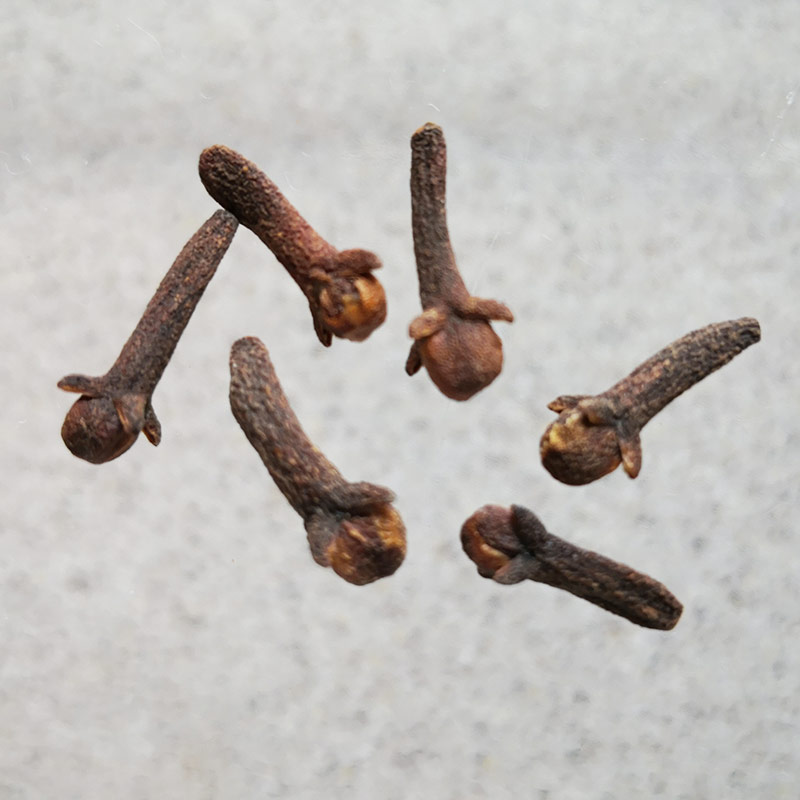Botanical name
Syzygium aromaticum (L.) Merr. et L. M. Perry
Family
Myrtaceae
Common name
Clove Tree
Information about the plant
The clove tree originates from a volcanic island chain located west of New Guinea, where wild clove trees can still be found today. From there, it reached the islands of Ambon and Seram to the south, where it was gradually domesticated. Today, clove tree is cultivated in many tropical countries. The species epithet aromaticum describes the intense, aromatic scent of the leaves.
The evergreen clove tree grows to a height of 20 m, bears leathery, glossy leaves and whitish-pink flowers arranged in triple trifoliate umbels. The flower buds, which are used as a spice, are reddish-brown and measure 15 to 17 cm long. The upper part is capitate and consists of four thick-fleshed, triangular sepals, which enclose four petals that form a spherical structure. The lower part of the bud is a narrow, square stem (botanically: receptacle), in which the ovary with the numerous ovules is located.
Medicinally used parts of plants (herbal drug)
The dried flower buds (cloves - Caryophylli flos) are mainly used as a spice, with their typical smell that is clearly perceptible when crushed. It is caused by an essential oil (clove oil), which is stored in large oil reservoirs within the flower bud tissue. Only the essential oil (clove oil - Caryophylli floris aetheroleum) is medicinally used.
The commercially available cloves are imported from Madagascar, Indonesia, Malaysia, Zanzibar, Pemba, Sri Lanka, and South America. The main suppliers of clove oil are Madagascar, Indonesia, and Tanzania.
Constituents of the herbal drug
Cloves contain essential oil (clove oil) with its aromatic smell of eugenol (main component), as well as flavonoids and tannins. Clove oil contains between 75% and 85% eugenol, as well as acetyl eugenol, ß-caryophyllene, and other terpenes.
Quality of the drug
The quality of the following drugs or drug preparations is specified in the European Pharmacopoeia (Ph. Eur):
- Cloves (Caryophylli flos)
- Clove oil (Caryophylli floris aetheroleum)
Medical applications
Recognised medical use
Only clove oil and the eugenol isolated from it are medicinally used.
The HMPC has classified clove oil as a traditional herbal medicinal product (see “Traditional use”).
ESCOP: Clove oil: short-term use as a local anesthetic in dentistry; as a disinfectant mouthwash; for chronic anal fissures. These applications are based on findings from human experience and long-standing use.
Traditional use
The HMPC has classified clove oil as a traditional herbal medicinal product (Article 16a of Directive 2001/83/EC). Based upon long-standing use, clove oil can be used to treat mild inflammation of the oral and pharyngeal mucosa and for the temporary relief of toothache caused by caries.
Herbal drug preparations in finished dosage forms
- Clove is a flavouring ingredient in tea blends
- Clove oil in mouthwashes (1 - 5%)
Dosage
Finished medicinal product: see patient information leaflet.
Rinse the mouth several times a day with diluted clove oil mouthwash. For local pain reduction in dentistry, clove oil is applied undiluted on a cotton pad.
Preparation of a tea
Notes
No safety studies are available on the use of clove oil during pregnancy or lactation. The use in children and adolescents under the age of 18 is not recommended due to a lack of evidence.
Side effects
Undiluted clove oil can cause tissue irritation.
Interactions
None known.
References
Herbal drug monographs
HMPC (2011, 2021), ESCOP (2014), WHO Vol. 2
Further literature
Commentary on the European Pharmacopoeia (Cloves, No. 0376; Clove oil, No. 1091)


